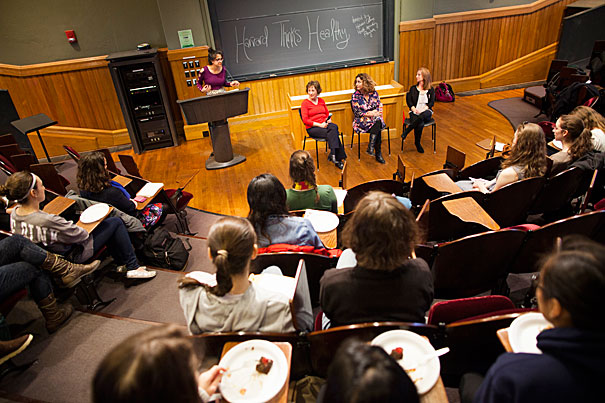
Overweight America may be diet-crazed, but diets work for only a few, said Harvard nutritionist Michelle Gallant (seated on left). Most are only short-term fixes. Many dieters sink into a cycle of under-eating followed by overeating, which leads to guilt. Intuitive eating is the middle way, she said. An event on healthy eating was held at Sever Hall with Gita Bhattacharya ’16 (at podium) moderating the panel that featured Gallant, Heidi Feinstein, and Ellen Frankel.
Stephanie Mitchell/Harvard Staff Photographer
A healthy replacement for dieting
Panel talks up benefits of ‘intuitive eating’
Champions of intuitive eating have a message for the diet-obsessed: Stop to smell the roses. And if the roses happen to be made of frosting, don’t feel bad about eating one.
Intuitive eating — the nondiet diet — abandons views of “good” and “bad” foods, and seeks to relocate mealtime beyond the shadows of insecurities and shortcomings. The idea calls for a wholesome diet, in harmony with the body. Eat what you’re hungry for, but only when you’re actually hungry. And stop eating when you’re full.
“There’s so much diet talk and fat talk that goes around. We have more important things to talk about,” said Michelle Gallant, a nutritionist with Harvard University Health Services, during a panel discussion before about 50 students Friday at Sever Hall.
Overweight America may be diet-crazed, but diets work for only a few, Gallant said. Most are only short-term fixes. Many dieters sink into a cycle of under-eating followed by overeating, which leads to guilt. Intuitive eating, she said, is the middle way.
Nourishment is key, obviously, but eating serves more than a single purpose. Pleasure has a place, too, said Ellen Frankel, a specialist in prevention and treatment of eating disorders. “Every meal doesn’t have to be nutritionally sound.”
Frankel and Gallant were joined on the panel by Heidi Feinstein, founder of Life Alive, a Massachusetts restaurant chain that emphasizes healthy eating. The event was sponsored by the Harvard College Health Advocacy Program (HAP) and Eating Concerns Hotline and Outreach (ECHO).
HAP co-president Gita Bhattacharya ’16 said the group decided on an event built around intuitive eating to make a point about the futility of dieting. Another student-specific concern, said Alice Li ’14, past president of HAP, is the campus environment: an often stressful one of late nights, where food is almost always within reach.
Panelists provided both an overview of intuitive eating and concrete tips on how to get started. The admonition to eat when hungry also means not waiting too long between meals, the group said, because to do so often leads to excess. Carry healthy snacks, said Feinstein and Frankel. And a student en route to the dining hall should take a moment to think through the many choices and what he or she is craving, Gallant said.
If it’s a cheeseburger, panelists said, the student should go ahead. Deprivation is likely to leave the body unsatisfied, which means snacking — and a worse result than just having the burger in the first place. “I will never not eat French fries and chocolate cake. I know they don’t nourish my body, but my body is nourished by the rest of the food [I eat],” Feinstein said.
Planning is essential, the panelists stressed. That goes especially for the late-night crammer, who should take time for snack breaks to avoid dipping into a bag of potato chips over and over. And, Frankel added, if a student is constantly running on empty thanks to all-nighters, it might be time to hit the brakes.
“What you’re hungry for is sleep, and food is not going to help that.”





